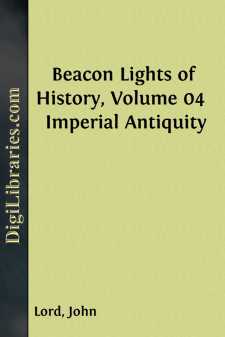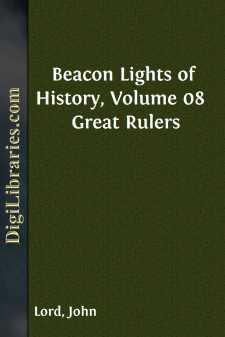Categories
- Antiques & Collectibles 13
- Architecture 36
- Art 48
- Bibles 22
- Biography & Autobiography 813
- Body, Mind & Spirit 142
- Business & Economics 28
- Children's Books 17
- Children's Fiction 14
- Computers 4
- Cooking 94
- Crafts & Hobbies 4
- Drama 346
- Education 46
- Family & Relationships 57
- Fiction 11829
- Games 19
- Gardening 17
- Health & Fitness 34
- History 1377
- House & Home 1
- Humor 147
- Juvenile Fiction 1873
- Juvenile Nonfiction 202
- Language Arts & Disciplines 88
- Law 16
- Literary Collections 686
- Literary Criticism 179
- Mathematics 13
- Medical 41
- Music 40
- Nature 179
- Non-Classifiable 1768
- Performing Arts 7
- Periodicals 1453
- Philosophy 64
- Photography 2
- Poetry 896
- Political Science 203
- Psychology 42
- Reference 154
- Religion 513
- Science 126
- Self-Help 84
- Social Science 81
- Sports & Recreation 34
- Study Aids 3
- Technology & Engineering 59
- Transportation 23
- Travel 463
- True Crime 29
Beacon Lights of History, Volume 10 European Leaders
by: John Lord
Description:
Excerpt
LOUIS NAPOLEON.
1808-1873.
THE SECOND EMPIRE.
Prince Louis Napoleon, or, as he afterward became, Emperor Napoleon III., is too important a personage to be omitted in the sketch of European history during the nineteenth century. It is not yet time to form a true estimate of his character and deeds, since no impartial biographies of him have yet appeared, and since he died less than thirty years ago. The discrepancy of opinion respecting him is even greater than that concerning his illustrious uncle.
No one doubts that the first Napoleon was the greatest figure of his age, and the greatest general that the world has produced, with the exception alone of Alexander and Caesar. No one questions his transcendent abilities, his unrivalled fame, and his potent influence on the affairs of Europe for a quarter of a century, leaving a name so august that its mighty prestige enabled his nephew to steal his sceptre; and his character has been so searchingly and critically sifted that there is unanimity among most historians as to his leading traits,--a boundless ambition and unscruplous adaptation of means to an end: that end his self-exaltation at any cost. His enlarged and enlightened intellect was sullied by hypocrisy, dissimulation, and treachery, accompanied by minor faults with which every one is familiar, but which are often overlooked in the immense services he rendered to his country and to civilization.
Napoleon III., aspiring to imitate his uncle, also contributed important services, but was not equal to the task he assumed, and made so many mistakes that he can hardly be called a great man, although he performed a great rôle in the drama of European politics, and at one time occupied a superb position. With him are associated the three great international wars which took place in the interval between the banishment of Napoleon I. to St. Helena and the establishment of the French Republic on its present basis,--a period of more than fifty years,--namely, the Crimean war; the war between Austria, France, and Italy; and the Franco-Prussian war, which resulted in the humiliation of France and the exaltation of Prussia.
When Louis Napoleon came into power in 1848, on the fall of Louis Philippe, it was generally supposed that European nations had sheathed the sword against one another, and that all future contests would be confined to enslaved peoples seeking independence, with which contests other nations would have nothing to do; but Louis Napoleon, as soon as he had established his throne on the ruins of French liberties, knew no other way to perpetuate his dominion than by embroiling the nations of Europe in contests with one another, in order to divert the minds of the French people from the humiliation which the loss of their liberties had caused, and to direct their energies in new channels,--in other words, to inflate them with visions of military glory as his uncle had done, by taking advantage of the besetting and hereditary weakness of the national character. In the meantime the usurper bestowed so many benefits on the middle and lower classes, gave such a stimulus to trade, adorned his capital with such magnificent works of art, and increased so manifestly the material prosperity of France, that his reign was regarded as benignant and fortunate by most people, until the whole edifice which he had built to dazzle the world tumbled down in a single day after his disastrous defeat at Sedan,--the most humiliating fall which any French dynasty ever experienced.
Louis Napoleon offers in his own person an example of those extremes of fortune which constitute the essence of romantic conditions and appeal to the imagination. The third son of Louis Bonaparte, King of Holland (brother of Napoleon), and Hortense Beauharnais, daughter of the Empress Josephine by her first marriage, he was born in Paris, in the palace of the Tuileries, April 20, 1808. Living in Switzerland, with his mother and brother (Napoleon Louis), he was well-educated, expert in all athletic sports,--especially in riding and fencing,--and trained to the study and practice of artillery and military engineering. The two brothers engaged in an Italian revolt in 1830; both fell ill, and while one died the other was saved by the mother's devotion. In 1831 the Poles made an insurrection, and offered Louis Napoleon their chief command and the crown of Poland; but the death, in 1832, of the only son of his uncle aroused Louis's ambition for a larger place, and the sovereignty of France became his "fixed idea." He studied hard, wrote and published several political and military works, and in 1836 made a foolish attempt at a Napoleonic revolt against Louis Philippe. It ended in humiliating failure, and he was exiled to America, where he lived in obscurity for about a year; but he returned to Switzerland to see his dying mother, and then was obliged to flee to England. In 1838 he published his "Napoleonic Ideas;" in 1840 he made, at Boulogne, another weak demonstration upon the French throne, and was imprisoned in the fortress of Ham. Here he did much literary work, but escaped in 1848 to Belgium, whence he hurried back to Paris when the revolution broke out. Getting himself elected a deputy in the National Assembly, he took his seat.
The year 1848, when Louis Napoleon appeared on the stage of history, was marked by extraordinary political and social agitations, not merely in France but throughout Europe. It saw the unexpected fall of the constitutional monarchy in France, which had been during eighteen years firmly upheld by Louis Philippe, with the assistance of the ablest and wisest ministers the country had known for a century,--the policy of which was pacific, and the leading political idea of which was an alliance with Great Britain. The king fled before the storm of revolutionary ideas,--as Metternich was obliged to do in Vienna, and Ferdinand in Naples,--and a provisional government succeeded, of which Lamartine was the central figure. A new legislative assembly was chosen to support a republic, in which the most distinguished men of France, of all opinions, were represented. Among the deputies was Louis Napoleon, who had hastened from England to take part in the revolution. He sat on the back benches of the Chamber neglected, silent, and despised by the leading men in France, but not yet hated nor feared.
When a President of the Republic had to be chosen by the suffrages of the people, Louis Napoleon unexpectedly received a great majority of the votes. He had been quietly carrying on his "presidential campaign" through his agents, who appealed to the popular love for the name of Napoleon.
The old political leaders, amazed and confounded, submitted to the national choice, yet stood aloof from a man without political experience, who had always been an exile when he had not been a prisoner. Most of them had supposed that Bonapartism was dead; but the peasantry in the provinces still were enthralled by the majesty and mighty prestige of that conqueror who had been too exalted for envy and too powerful to be resisted. To the provincial votes chiefly Louis Napoleon owed his election as President,--and the election was fair. He came into power by the will of the nation if any man ever did,--by the spontaneous enthusiasm of the people for the name he bore, not for his own abilities and services; and as he proclaimed, on his accession, a policy of peace (which the people believed) and loyalty to the Constitution,--Liberty, Fraternity, and Equality, the watchwords of the Revolution,--even more, as he seemed to represent the party of order, he was regarded by such statesmen as Thiers and Montalembert as the least dangerous of the candidates; and they gave their moral support to his government, while they declined to take office under him.
The new President appointed the famous De Tocqueville as his first prime minister, who after serving a few months resigned, because he would not be the pliant tool of his master. Louis Napoleon then had to select inferior men for his ministers, who also soon discovered that they were expected to be his clerks, not his advisers. At first he was regarded by the leading classes with derision rather than fear,--so mean was his personal appearance, so spiritless his address, so cold and dull was his eye, and so ridiculous were his antecedents. "The French," said Thiers, long afterward, "made two mistakes about Louis Napoleon,--the first, when they took him for a fool; the second, when they took him for a man of genius." It was not until he began to show a will of his own, a determination to be his own prime minister, that those around him saw his dangerous ambition, his concealed abilities, and his unscrupulous character.
Nothing of importance marked the administration of the President, except hostility to the Assembly, and their endless debates on the constitution. Both the President and the Assembly feared the influence of the ultra-democrats and Red Republicans,--socialists and anarchists, who fomented their wild schemes among the common people of the large cities. By curtailing the right of suffrage the Assembly became unpopular, and Louis Napoleon gained credit as the friend of order and law.
As the time approached when, by the Constitution, he would be obliged to lay down his office and return to private life, the President became restless, and began to plot for the continuance of his power. He had tasted its sweets, and had no intention to surrender it. If he could have been constitutionally re-elected, he probably would not have meditated a coup d'état, for it was in accordance with his indolent character to procrastinate. With all his ambition, he was patient, waiting for opportunities to arise; and yet he never relinquished an idea or an intention,--it was ever in his mind: he would simply wait, and quietly pursue the means of success. He had been trained to meditation in his prison at Ham; and he had learned to disguise his thoughts and his wishes. The power which had been developed in him in the days of his obscurity and adversity was cunning. As a master of cunning he saw the necessity of reserve, mistrust, and silence.
The first move of the President to gain his end was to secure a revision of the Constitution. The Assembly, by a vote of three-fourths, could by the statutes of 1848 order a revision; a revision could remove the clause which prohibited his re-election, and a re-election was all he then pretended to want. But the Assembly, jealous of its liberties, already suspicious and even hostile, showed no disposition to smooth his way. He clearly saw that some other means must be adopted. He naturally turned to the army; but the leading generals distrusted him, and were in the ranks of his enemies. They were all Orléanists or Republicans.
The ablest general in France was probably Changarnier, who had greatly distinguished himself in Algeria. He had been called, on the change of government, to the high post of commander of the National Guards and general of the first military division, which was stationed at Paris. He had been heard to say that if Louis Napoleon should undertake a coup d'état, he would conduct him as a prisoner to Vincennes. This was reported to the President, who at once resolved to remove him, both from hostility and fear. On Changarnier's removal the ministry resigned. Their places were taken by tools still more subservient.
Nothing now remained but to prepare for the meditated usurpation. The first thing to be done was to secure an able and unscrupulous minister of war, who could be depended upon. As all the generals received their orders from the minister of war, he was the most powerful man in France, next to the President. Such was military discipline that no subordinate dared to disobey him.
There were then no generals of ability in France whom Louis Napoleon could trust, and he turned his eyes to Algeria, where some one might be found. He accordingly sent his most intimate friend and confidant, Major Fleury, able but unscrupulous, to Algeria to discover the right kind of man, who could be bribed. He found a commander of a brigade, by name Saint-Arnaud, extravagant, greatly in debt, who had done some brave and wicked things. It was not difficult to seduce a reckless man who wanted money and preferment. Fleury promised him the high office of minister of war, when he should have done something to distinguish himself in the eyes of the Parisians. Saint-Arnaud, who proved that he could keep a secret, was at once promoted, and a campaign was arranged for him in the summer of 1851, in which he won some distinction by wanton waste of life. His exploits were exaggerated, the venal Press sounded his praises, and he was recalled to Paris and made minister of war; for the President by the Constitution could nominate his ministers and appoint the high officers of State. Other officers were brought from Algeria and made his subordinates. The command of the army of Paris was given to General Magnan, who was in the secret. The command of the National Guards was given to a general who promised not to act, for this body was devoted to the Assembly. M. Maupas, another conspirator, of great administrative ability, was made prefect of police.
Thus in September, 1851, everything was arranged; but Saint-Arnaud persuaded the President to defer the coup d'état until winter, when all the deputies would be in Paris, and therefore could be easily seized. If scattered over France, they might rally and create a civil war; for, as we have already said, the Assembly contained the leading men of the country,--statesmen, generals, editors, and great lawyers, all hostile to the ruler of the Republic.
So the President waited patiently till winter. Suddenly, without warning, in the night of the 2d of December, all the most distinguished members of the Assembly were arrested by the police controlled by Maupas, and sent to the various prisons,--including Changarnier, Cavaignac, Thiers, Bedeau, Lamoricière, Barrot, Berryer, De Tocqueville, De Broglie, and Saint-Hilaire. On the following morning strong bodies of the military were posted at the Palais Bourbon (where the Assembly held its sessions), around all the printing-presses, around the public buildings, and in the principal streets. In the meantime, Morny was made minister of the interior. Manifestoes were issued which announced the dissolution of the Assembly and the Council of State, the restoration of universal suffrage, and a convocation of the electoral college to elect the Executive. A proclamation was also made to the army, containing those high-sounding watchwords which no one was more capable of using than the literary President,--eloquent, since they appealed to everything dear to the soldiers' hearts, and therefore effective. Louis Napoleon's short speeches convinced those for whom they were intended. He was not so fortunate with his books.
The military and the police had now the supreme control of Paris, while the minister of the interior controlled the municipalities of the various departments. All resistance was absurd; and yet so tremendous an outrage on the liberties of the nation provoked an indignation, especially among the Republicans, which it was hard to suppress. The people rallied and erected barricades, which of course were swept away by the cannon of General Magnan, accompanied by needless cruelties and waste of blood, probably with the view to inspire fear and show that resistance was hopeless.
Paris and its vicinity were now in the hands of the usurper, supported by the army and police, and his enemies were in prison. The Assembly was closed, as well as the higher Courts of Justice, and the Press was muzzled. Constitutional liberty was at an end; a despot reigned unopposed. Yet Louis Napoleon did not feel entirely at his ease. Would the nation at the elections sustain the usurpation? It was necessary to control the elections; and it is maintained by some historians that every effort to that end was made through the officials and the police. Whether the elections were free or not, one thing astonished the civilized world,--seven millions of votes were cast in favor of Louis Napoleon; and the cunning and patient usurper took possession of the Tuileries, re-elected President to serve for ten years. Before the year closed, in December, 1852, he was proclaimed Emperor of the French by the vote and the will of the people. The silent, dull, and heavy man had outwitted everybody; and he showed that he understood the French people better than all the collected statesmen and generals who had served under Louis Philippe with so much ability and distinction.
What shall we say of a nation that so ignominiously surrendered its liberties? All we can say in extenuation is that it was powerless. Such men as Guizot, Thiers, Cousin, Changarnier, Cavaignac, Molé, Broglie, Hugo, Villemain, Lamartine, Montalembert, would have prevented the fall of constitutional government if their hands had not been tied. They were in prison or exiled. Some twenty-five thousand people had been killed or transported within a few weeks after the coup d'état, and fear seized the minds of those who were active in opposition, or suspected even of being hostile to the new government. France, surprised, perplexed, affrighted, must needs carry on a war of despair, or succumb to the usurpation. The army and the people alike were governed by terror.
But although France had lost her freedom, it was only for a time; and although Louis Napoleon ruled as an absolute monarch, his despotism, sadly humiliating to people of intelligence and patriotism, was not like that of Russia, or even like that of Prussia and Austria. The great men of all parties were too numerous and powerful to be degraded or exiled. They did not resist his government, and they held their tongues in the cafés and other assemblies where they were watched by spies; but they talked freely with one another in their homes, and simply kept aloof from him, refusing to hold office under him or to attend his court, waiting for their time. They knew that his government was not permanent, and that the principles of the Revolution had not been disseminated and planted in vain, but would burst out in some place or other like a volcano, and blaze to heaven. Men pass away, but principles are indestructible.
Louis Napoleon was too thoughtful and observant a man not to know all this. His residence in England and intercourse with so many distinguished politicians and philosophers had taught him something. He feared that with all his successes his throne would be overturned unless he could amuse the people and find work for turbulent spirits. Consequently he concluded on the one hand to make a change in the foreign policy of France, and on the other to embellish his capital and undertake great public works, at any expense, both to find work for artisans and to develop the resources of the country.
When Louis Napoleon made his first attack on the strong government of Louis Philippe, at Strasburg, he was regarded as a madman; when he escaped from Ham, after his failure at Boulogne, he was looked upon by all Europe as a mere adventurer; and when he finally left England, which had sheltered him, to claim his seat in the National Assembly of republican France, and even when made President of the republic by the suffrages of the nation, he was regarded as an enigma. Some thought him dull though bold, and others looked upon him as astute and long-headed. His heavy look, his leaden eye, his reserved and taciturn ways, with no marked power but that of silence and secrecy, disarmed fe












